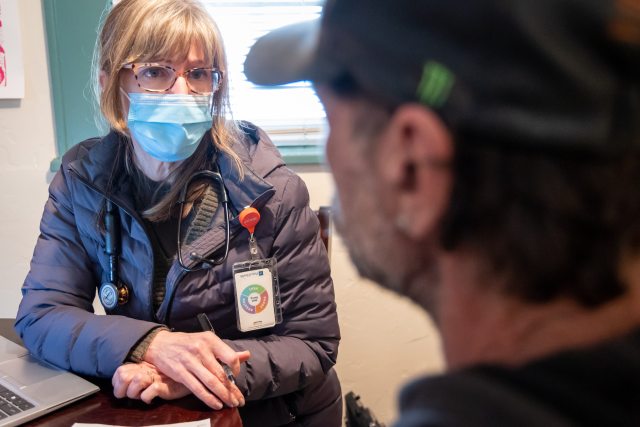House calls for unhoused patients

Serving people where they live
Jeffrey’s teeth hurt. Really hurt. The pain was so bad that he pulled out five teeth himself.
He needed dental treatment, but dental clinics wouldn’t work on him until he took care of his high blood pressure.
Fortunately, Jeffrey found a healthcare provider who could help — near where he lives.
Kathy Kernan, a PeaceHealth nurse practitioner, regularly sees patients at a community of small huts in west Eugene. It is one of 14 sites operated by the nonprofit Community Supported Shelters. The sites provide short-term shelter for people experiencing homelessness.
Each hut in the community is 10 feet long and 6 feet wide. Jeffrey and his wife live in neighboring huts while they look for a better situation in Eugene’s tight housing market. They had to move when the property they were living on was sold.
Jeffrey shared with Kathy that he worked in landscaping for more than 20 years and just quit his job. He finally has time to get the medical care he put off for years.
Every other week, a PeaceHealth team of a provider, nurse and case manager travel across town to the shelter community to help patients with prescriptions, chronic conditions and basic wound care. The case manager helps people, including Jeffrey, register as PeaceHealth patients and apply for Medicaid.
The team encourages new patients to make a follow-up appointment at PeaceHealth’s Unified Care Clinic (UCare Clinic) near PeaceHealth’s hospital in downtown Eugene.
Meeting patients where they are
Created in 2014, the UCare Clinic provides physical and behavioral health services in the same office. From the start, in addition to seeing patients in the clinic, the UCare team has gone out to the community.
“We made it part of our mission early on,” said Alex Holmes, UCare Clinic’s nurse manager. “We want to go to these patients because often it’s difficult for them to come to us.”
Many of the people served by the UCare team haven’t been getting regular medical care. They often have untreated chronic conditions, complicated by mental illness or substance use disorder.
“We do everything we can to try to meet patients where they are, without judgment,” Kathy said. “It is incredibly fulfilling when, despite so many obstacles in their lives, patients begin to trust us and start making meaningful improvements in their health.”
The UCare Clinic offers an open door for people who have been shut out of other medical offices for a number of reasons. They may have missed too many appointments. Or they didn’t follow their provider’s instructions or acted out in clinic. In some cases, a provider may have felt unequipped to care for them without also consulting a mental health professional.
The UCare Clinic team does things differently. If someone shows up and is having a bad day, they are invited in to have a cup of coffee and talk. “We have same-day appointments,” Kathy explained. “And even if we don’t have room, we’ll figure it out.”
When patients don’t show up for an appointment, the team tries to find out why and offers help with transportation or visits them where they live.
‘A blessing’
After meeting with Kathy, Jeffrey left with a prescription for blood pressure medicine to fill at a pharmacy nearby and a plan to see her again in two weeks at the UCare Clinic.
“You guys are all a blessing to people in my situation,” he told Kathy and Alex. “I don’t know what I’d be doing otherwise. I’d be suffering.”
Watch Jeffrey explain how he felt after seeing a primary care provider for the first time in years.





